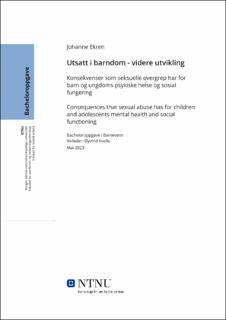| dc.contributor.advisor | Kvello, Øyvind | |
| dc.contributor.author | Ekren, Johanne | |
| dc.date.accessioned | 2023-06-27T17:20:09Z | |
| dc.date.available | 2023-06-27T17:20:09Z | |
| dc.date.issued | 2023 | |
| dc.identifier | no.ntnu:inspera:146306513:64447318 | |
| dc.identifier.uri | https://hdl.handle.net/11250/3073745 | |
| dc.description.abstract | I denne bacheloroppgaven tar jeg for meg konsekvensene etter seksuelle overgrep, spesielt i barndommen, og hvilke faktorer som spiller inn på disse. Fokuset vil rettes mot de psykiske og sosiale konsekvensene som oppstår etter seksuelle overgrep, og hvordan dette påvirker tilknytning og sosial fungering i videre utvikling.
Seksuelle overgrep i barndommen har andre faktorer enn overgrep i ungdomsårene og i voksen alder. I tidlig alder spiller støtte fra omsorgspersonene til den enkelte en stor rolle i håndtering av stressende belastninger. Dersom en omsorgsperson er den som utfører de ulovlige handlingene, kan det føre til mer skadelige konsekvenser sammenlignet med ukjente overgripere. Dette skyldes et tillitsbrudd som skapes mellom barnet og omsorgspersonen. Videre utvikling bygger på tillit og trygghet, til oss selv, og til verden rundt oss. Grunnleggende tillit og trygg tilknytning skapes gjennom gode samspill og erfaringer med omsorgspersonene, og blir ansett som en beskyttelsesfaktor. Det motsatte, som er en utrygg tilknytning, vil bli ansett som en risikofaktor. Desorganisert tilknytning handler om dysfunksjonelle reguleringsevner i stressende situasjoner, og er den alvorligste graden for utrygg tilknytning. En slik tilknytning kan oppstå når det forekommer seksuelle overgrep i barndommen begått av tillitspersoner. Desorganisert tilknytning øker risikoen for psykiske lidelser og sosiale vansker.
Videre utvikling bygger på det grunnlaget som barnet skaffet i sine første leveår. Det bygger også på de indre arbeidsmodellene som utvikles gjennom tilknytningen. Her speiles hvordan barnet ble møtt av omsorgspersonene i tidlige relasjoner. Forstyrrelser av de indre arbeidsmodellene, for eksempel i form av seksuelle overgrep i barndommen, kan være en faktor for senere psykisk helse. Det kan føre til vansker med sosial fungering og inngåelse av nye sosiale relasjoner, da de har vansker for å stole på andre grunnet sterk følelse av mistillit mot andre nære mennesker tidligere. Overgrepene kan også føre til bekymringsfull eller skadelig seksuell atferd eller seksuelle vansker i senere tid. Begge disse er ganske sikre indikatorer på seksuelle overgrep i barndommen, da flere konsekvenser korrelerer med andre traumesymptomer. | |
| dc.description.abstract | In this thesis, i look at the different consequences of sexual abuse, especially abuse that has accured during their childhood, and factors that play a role in these. The focus will be on psychological and social consequences that occur after sexual abuse, and how this affects attachment and social functioning in further development.
Child sexual abuse has different factors than abuse in adolescence and adulthood. At an early age, support from the caregivers of the individual plays a major role in handling stressful situations. If a caregiver is the one who carries out the illegal acts, it can lead to more harmful consequences compared to unknown abusers. This is due to a breach of trust between the child and the caregiver. Further development is based on trust and security, in ourselves, and in the world around us. Fundamental trust and secure attachment are created through good interactions and experiences with the caregiver, and are considered a protective factor. The opposite, which is an insecure attachment, will be considered a risk factor. Disorganized attachment is about dysfunctional regulatory abilities in stressful situations, and is the most serious degree of insecure attachment. this type of attachment can arise when there is sexual abuse in childhood committed by a person of trust. Disorganized attachment increases the risk of mental disorders and social difficulties.
Further development builds on the foundation that the child acquired in his first years of life. It is also based on the internal working models that are developed through the attachment. This reflects how the child was met by the caregivers in early relationships. Disturbances of the internal working models, for example in form of child sexual abuse, can be a factor in later mental health. It can lead to difficulties with social functioning and entering into new social relationships and interactions, as they have difficulties to trust others due to strong feelings of mistrust towards other close people in the past. The abuse can also lead to harmful sexual behavior or sexual difficulties later on. Both of these are fairly certain indicators of child sexual abuse, as several other consequences correlate with other trauma symptoms. | |
| dc.language | nob | |
| dc.publisher | NTNU | |
| dc.title | Utsatt i barndom - videre utvikling | |
| dc.type | Bachelor thesis | |
